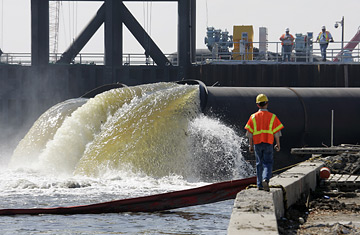
Daren J. Eller watches as pumps put in place by the Army Corps of Engineers pump water from New Orleans' 17th Street Canal to Lake Pontchartrain in New Orleans, Saturday, March 10, 2007.
Once again, it's President Bush against just about everyone else. This time, he's vowing to veto the Water Resources Development Act, a wildly popular collection of 940 Army Corps of Engineers projects, including $3.5 billion for post-Katrina Louisiana and $2 billion for the Florida Everglades. The House passed it Wednesday night in a 381-40 squeaker, and the Senate vote should be similar; archliberal Senate Environment and Public Works Committee Chair Barbara Boxer of California and archconservative ranking Republican James Inhofe of Oklahoma can't agree on the color of the sky, but they're both pledging to override a veto.
But this time, Bush is right. WRDA is a lousy bill, stuffed with more pork than Sonny's Barbecue, coddling a dysfunctional agency, perpetuating a dysfunctional system. Louisiana and the Everglades need help, but they won't get it until Congress fixes the Corps. This bill just sets the stage for future Katrinas.
The last President to threaten to veto a water bill was Ronald Reagan, and the result was the last meaningful reforms of the Corps. But the Corps is still responsible for reviewing its own projects, which is kind of like having Keanu Reeves responsible for reviewing his own movies. So the Corps is still approving and building economically indefensible and environmentally destructive projects — manhandling rivers for nonexistent barges, deepening ports for nonexistent ships, pouring sand onto beaches, and generally moving dirt and pouring concrete wherever its congressional patrons want.
As I explain this week in TIME, Hurricane Katrina was a manmade disaster, attributable almost entirely to the Corps. It should have been a teachable moment. But in Congress there's still rabid bipartisan support for the status quo — as long as all 535 members can bring home their pet water projects. President Bush has not usually distinguished himself as a tightwad, but when it comes to the Corps — an agency he doesn't control as much as he'd like — his budgets have been consistently stingy.
And Congress has consistently ignored them. This time, the House initially passed a $14 billion version of the bill, the Senate a $15 billion version. Somehow, the two chambers compromised on a $20 billion bill — even though the Corps already has a $58 billion backlog of unfinished projects. The House and Senate versions both had $31 million for a marine terminal in Portsmouth, Virginia, but the final version had $356 million, because Senator John Warner of Virginia served on the House-Senate committee that drafted it. Who said compromise was dead?
The Bush Administration's veto message called the bill "unaffordable, but there are deeper problems with the bill that reflect deeper problems with the Corps and its enablers in Congress. The Corps is funded almost entirely by "earmarks, specific projects requested by specific Congressmen, so there's no way to prioritize between national emergencies (such as stronger levees to prevent a Katrina-style catastrophe in Sacramento) and preposterous pork (such as a notorious $459 million flood-control scheme for Dallas, a study of a $3 billion dam on the Susitna River that Representative Don Young wants in Alaska, or the seven water and sewage treatment projects that Senate Majority Leader Harry Reid tucked into the bill for Nevada.) The Senate considered an amendment that would have required prioritization of Corps projects according to national need, but it was overwhelmingly rejected. That's because the Corps is essentially a Congressional agency, and Corps projects are a form of currency on Capitol Hill; members use them to steer jobs and money to their districts and donors.
Usually, Congress passes a water bill every two years. But in 2000, the Corps got caught skewing an economic analysis to justify a $1 billion expansion of navigation locks on the Mississippi and Illinois Rivers; its leaders even launched a secret "Program Growth Initiative designed to lard their budget with big projects. Several independent investigations found evidence of deep systemic problems at the agency, and Senators Russell Feingold and John McCain have held up WRDA ever since, vowing not to let any more water pork through the Senate unless Congress agreed to allow independent reviews of Corps projects.
Congress finally considered some modest reforms this year, but ultimately watered them down; the reviews aren't really independent, and the Corps can avoid them or ignore them. But the bill does revive the scandalous lock expansions — except they're now up to $2 billion. Senator Christopher Bond of Missouri wants them, and the Corps figured out a new way to approve them, so they're good to go unless Bush can stop them.
Democratic Senator Feingold was one of the President's only defenders on the Hill yesterday. On the other hand, Republican Senator David Vitter emerged from semi-seclusion to say he was "stunned by Bush's veto threat, and accuse the President of abandoning Louisiana. It's true that the bill includes some projects to help restore Louisiana's vanishing coastal marshes and cypress swamps, which provide natural protection for New Orleans. (It's also true that Vitter had pushed to help timber firms to log those cypress swamps.) But as I explain in TIMR, the bill's main Louisiana project — a 72-mile levee for some bayou towns — is a giant step in the wrong direction, accelerating the wetlands losses that left New Orleans exposed to Katrina.
Ultimately, it's up to the Corps to reverse those losses — and to undo the damage it's done to the Everglades as well. But that will require a different Corps. And there's only one way to get Congress to reform its favorite agency: hold up its pork until it squeals.
